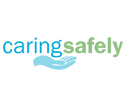Mojgan Nemati, a web developer at UHN, was in the photocopy room when she came face to face with a young woman – a stranger – hovering by the door. The woman wasn't wearing an ID badge, and appeared out of place on the administrative floor where Mojgan sits.
After offering assistance and asking questions that elicited vague responses from the woman, Mojgan's instincts kicked in. She and a colleague notified security.
 Fast forward eight months and Mojgan found herself participating in UHN's Caring Safely training session – a three-hour workshop for all staff, which began in May and will continue rolling out through the summer and into early 2018. It was there, while examining a case study that sounded similar to her own experience, that she had her "Aha!" moment.
Fast forward eight months and Mojgan found herself participating in UHN's Caring Safely training session – a three-hour workshop for all staff, which began in May and will continue rolling out through the summer and into early 2018. It was there, while examining a case study that sounded similar to her own experience, that she had her "Aha!" moment.
"It was the first time I really felt the connection between Caring Safely and my non-clinical role," Mojgan says of the session, which included staff from different areas across the organization.
UHN's Caring Safely Transformation was launched by President and CEO Dr. Peter Pisters at the 2015 Annual General Meeting. It's built on the understanding that a key step on the path to becoming a High Reliability Organization committed to zero preventable harm among patients and in the workplace, is the responsibility of everyone at UHN – both those in clinical as well as non-clinical roles.
No matter where we work within the hospital, we interact with either patients, staff, students or volunteers – which means we all have an opportunity to contribute to a culture of safety.
"One of the goals of the training sessions is to debunk the notion that Caring Safely only applies to clinical staff," says Brenda Perkins-Meingast, Caring Safely Education Lead. "Among the ways we hope to achieve this is by presenting error prevention tools that can be used in any context, no matter where someone works at UHN."
Through last week, 1861 staff had attended a training session, and that number is expected to reach 2,250 by the end of June. The Education team aims to have attendance hit 80 per cent by the end of 2017.
Following their training sessions, staff report feeling engaged and energized, and note that the three-hour session flies by.
Mojgan cites two big take-aways from her training session: One was a feeling of encouragement, after watching a video of UHN's leaders open up about their own medical errors.
"If they can speak up for safety, so can I," she says.
It turns out that Mojgan has already been using many Caring Safely tools, such as STAR (Stop, Think, Act, Review), when sending emails, and Asking Clarifying Questions, when handling a project.
"We've all been using these tools informally," she says. "Now, they've been given more structure."
